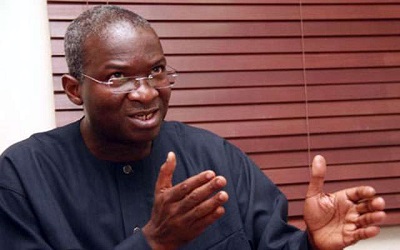Don’t stop electricity tariff review, Fashola begs Nigerians

The Minister of Power, Works and Housing, Mr. Babatunde Fashola, has said Nigerians should stop going to court to stop electricity tariff review, describing the planned review as necessary.
Fashola stated this on Thursday at a public lecture organised by the Department of Economics, University of Lagos, where he spoke on the power sector reform in Nigeria, challenges and the way forward.
He said he fully supported the privatisation of the power sector, adding, “I believe, however, that the privatisation that we did in 2013 was well-intentioned but delivered with some deception.”
The minister, however, opposed the calls for the cancellation of the privatisation from some quarters, but highlighted the need to rework the process and make it work.
Speaking on tariff, he stated, “Tariff is not fixed by the minister; I don’t fix tariff. I have no power over it. What happened during the last tariff exercise was that I expressed an opinion of support for the tariff.
“Tariff is fixed by the Nigerian Electricity Regulatory Commission. Tariff proposals come from your Discos who should have met with you at consultative meetings. When tariff meetings are called in the future, everybody must be there.”
According to the minister, there are major and minor tariff reviews, and a major review is due every five years, but a minor review is due every six months.
“It doesn’t mean every time a minor review is due, the tariff will increase. If exchange rate is N165 (to a dollar) when the tariff was reviewed and then it goes to N400, put yourself in their shoes,” he said.
Describing tariff reviews as a necessary part of any business, he cited Singapore as one of the countries that had really implemented tariff review for all of its utilities effectively.
Fashola said, “We must stop going to court. I know some lawyers don’t like this. To get injunction to stop tariff reviews, it puts us in the news for the wrong reasons.
“Government must also not interfere with tariff. One of the things that happen in the last elections was that as the elections were coming, the last administration reduced tariff in order to make you and I like them. But it created a massive debt for Nigeria.”
He added that when the government ordered the tariff reduction, it did not reduce interest rates, the exchange rate cost of wages of the staff that were generating power or the cost of gas and other inputs.
The minister said the capacity of the power grid had expanded to 6,200 Megawatts under the President Muhammadu Buhari administration following the completion of some transmission projects.
He said, “When the National Integrated Power Project started, that is over 10 years ago now, several contracts were issued to develop transmission projects. Many of the equipment that were imported by the contractors were trapped at our own ports in 800 containers for almost 10 years, because the government did not budget to pay those contractors.”







